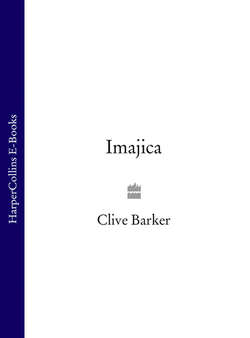Читать книгу Imajica - Clive Barker, Clive Barker - Страница 50
ОглавлениеCHAPTER TWENTY-ONE
1
The Retreat at the Godolphin Estate had been built in an age of follies, when the oldest sons of the rich and mighty, having no wars to distract them, amused themselves spending the gains of generations on buildings whose only function was to flatter their egos. Most of these lunacies, designed without care for basic architectural principles, were dust before their designers. A few, however, became noteworthy even in neglect, either because somebody associated with them had lived or died in notoriety, or because they were the scene of some drama. The Retreat fell into both categories. Its architect, Geoffrey Light, had died within six months of its completion, choked by a bull’s pizzle in the wilds of West Riding, a grotesquerie which attracted some attention. As did the retirement from the public eye of Light’s patron, Lord Joshua Godolphin, whose decline into insanity was the talk of court and coffee-house for many years. Even at his zenith he’d attracted gossip, mainly because he kept the company of magicians. Cagliostro, the Comte de Saint-Germain, and even Casanova (reputedly no mean thaumaturgist) had spent time on the Estate, as well as a host of lesser-known practitioners.
His Lordship had made no secret of his occult investigations, though the work he was truly undertaking was never known to the gossips. They assumed he kept company with these mountebanks for their entertainment value. Whatever his reasons, the fact that he retired from sight so suddenly drew further attention to his last indulgence, the folly Light had built for him. A diary purported to have belonged to the choked architect appeared a year after his demise, containing an account of the Retreat’s construction. Whether it was the genuine article or not, it made bizarre reading. The foundations had been laid, it said, under stars calculated to be particularly propitious; the masons - sought and hired in a dozen cities - had been sworn to silence with an oath of Arabic ferocity. The stones themselves had been individually baptized in a mixture of milk and frankincense and a lamb been allowed to wander through the half-completed building three times, and the altar and font been placed where it had laid its innocent head.
Of course these details were soon corrupted by repetition, and Satanic purpose ascribed to the building. It became babies’ blood that was used to anoint the stone, and a mad dog’s grave that marked the spot where the altar was built. Sealed up behind the high walls of his sanctum it was doubtful that Lord Godolphin even knew that such rumours were circulating until, two Septembers after his withdrawal, the inhabitants of Yoke, the village closest to the Estate, needing a scapegoat to blame the poor harvest upon, and inflamed by a passage from Ezekiel delivered from the pulpit of the parish church, used the Sunday afternoon to mount a crusade against the Devil’s work, and climbed the gates of the Estate to raze the Retreat to the ground. They found none of the promised blasphemies. No inverted cross; no altar stained with virginal blood. But having trespassed they did what damage they could inflict out of sheer frustration, finally setting a bonfire of baled hay in the middle of the great mosaic. All the flames did was lick the place black, but the Retreat earned its nickname from that afternoon: the Black Chapel; or Godolphin’s Sin.
2
If Jude had known anything about the history of Yoke she might well have looked for signs of its echoes in the village as she drove through. She would have had to look hard, but the signs were there to be found. There was scarcely a house within its bounds that didn’t have a cross carved into the keystone above the door, or a horseshoe cemented into the doorstep. If she’d had time to linger in the churchyard she would have found inscribed on the stones there entreaties to the good Lord that He keep the Devil from the living even as he gathered the dead to His Bosom, and on the board beside the gate a notice announcing that next Sunday’s sermon would be The Lamb in Our Lives’, as though to banish any lingering thought of the infernal goat.
